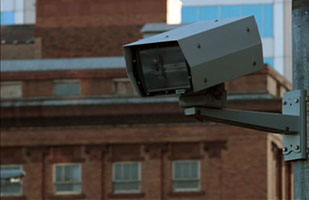Red-Light Camera Dispute Scheduled for Argument at Supreme Court

Legislation that placed stricter rules on red-light camera programs is at the heart of a conflict between the state and Ohio municipalities.

Legislation that placed stricter rules on red-light camera programs is at the heart of a conflict between the state and Ohio municipalities.
The city of Dayton is challenging legislation passed in 2014 that places limits on how automated traffic cameras can be used to catch people running red lights and speeding through intersections.
At issue are three provisions in the 2014 law that Dayton argues are unconstitutional because they prevent municipalities from exercising their home-rule authority. The city’s appeal will be considered by the Supreme Court during next week’s oral arguments, the first of 2017 and the first with two new members of the Court – Justice Patrick F. Fischer and Justice R. Patrick DeWine.
Automated Cameras Become Popular in State
Dayton installed automated traffic cameras in 2002 to ticket drivers who run red lights and expanded its program in 2010 to catch speeding infractions. Other cities across the state also implemented automated camera systems that impose fines for traffic violations.
In 2014, the Ohio General Assembly passed Senate Bill 342, which regulates the use of the cameras statewide. Among its provisions, the law requires a full-time police officer to be present where the cameras are operating, mandates a traffic study before a camera can be installed, and sets conditions for issuing tickets in certain locations. Some cities have shut down their programs following S.B. 342’s enactment.
City and State at Odds on Law’s Purpose
Noting that the Ohio Supreme Court in 2008 upheld the right of municipalities to employ these programs, Dayton contends that the legislature drafted the law to stop local governments from using traffic cameras. The contested provisions also unconstitutionally limit municipal powers ensured by the state constitution, the city reasons.
On behalf of the state, the attorney general counters that municipalities can issue traffic citations using automated cameras as long as their local ordinances don’t conflict with laws passed by the General Assembly. Explaining that municipalities share police powers with the state, the attorney general argues that S.B. 342 provides a uniform, statewide framework for overseeing automated traffic cameras and that state law overrides local laws in these types of regulations.
The Supreme Court has held three other cases, including appeals from Springfield and Toledo, for a decision in this case.
Oral Arguments
Dayton v. State and two other cases will be heard on Tuesday, Jan. 10. Three more cases will considered on Wednesday, Jan. 11. Arguments on both days will begin at 9 a.m. at the Thomas J. Moyer Ohio Judicial Center in Columbus and will be streamed live online at sc.ohio.gov and broadcast live on The Ohio Channel.
Previews Available
Along with the brief descriptions below, the Office of Public Information today released previews of the six cases.
Cases for Tuesday, January 10
In State v. Thomas, a Mentor-on-the-Lake man appeals his convictions and death sentence for the murder of a local bartender found brutally beaten and murdered the day after Thanksgiving in 2010. The man contends that presenting seven hours of police interrogation videos to the jury undermined the jury’s role to independently determine the facts, that the circumstantial case against him didn’t prove his guilt beyond a reasonable doubt, that his lawyers should have challenged certain potential jurors during voir dire, among numerous other arguments.
The Board of Professional Conduct recommends a two-year suspension, with six months stayed, for a Columbus attorney charged with violating rules in four matters, which include filing an entry of a mediated agreement with a court when no agreement was reached, and asking a court to declare a debt has been paid when it wasn’t. In Cleveland Metro. Bar Assn. v. Donchatz¸ the attorney asks for a lesser sanction because no clients were harmed, while the bar association argues he deserves an indefinite suspension. The lawyer is a former attorney with the Ohio Office of Disciplinary Counsel, who has characterized himself as a legal ethics expert and has used the moniker “the ethics monster.”
Cases for Wednesday, January 11
An employee of the Girl Scouts received workers’ compensation benefits after a 2008 injury at work. Her benefits for a previously existing autoimmune disorder that was aggravated by the injury were stopped five years later when the Bureau of Workers’ Compensation determined that the disorder had returned to its pre-injury level. The employee appealed the termination of this part of her award, but the bureau asserts in Clendenin v. Girl Scouts of W. Ohio that this benefit has been only temporarily, rather than permanently, suspended and could be reinstated if necessary.
In 2011, two northeast Ohio men agreed to a sale of partial ownership in a company, but the buyer died before completing the transaction. An attorney for the owner submitted a claim against the estate for $200,000 to cover the rest of the sale price, and sent the claim to a lawyer overseeing the buyer’s trust and his former business manager. Both recipients forwarded the claim to the executor, who denied the claim, stating that state law required it be sent directly to the executor or the estate’s attorney. In Wilson v. Lawrence, the Court is asked if a claim is valid if it reaches the executor by the law’s deadline, albeit indirectly.
When a University of Toledo law school graduate applied to take the 2016 bar exam, he described traffic incidents with police by referencing the Ku Klux Klan on forms in which he had to report tickets. The board that assesses candidates for character and fitness to practice law recommends that the graduate be prohibited from taking the bar exam until July 2019. The graduate objects to the delay in In re Application of Coll, maintaining he was exercising his free-speech rights and isn’t unqualified to practice law simply based on his comments about racism in his application.


